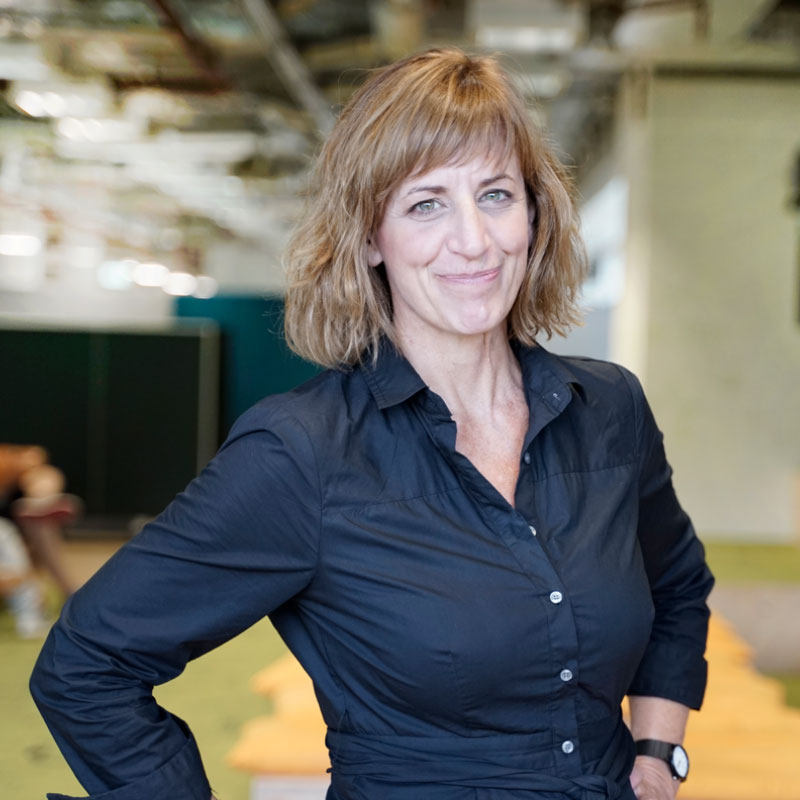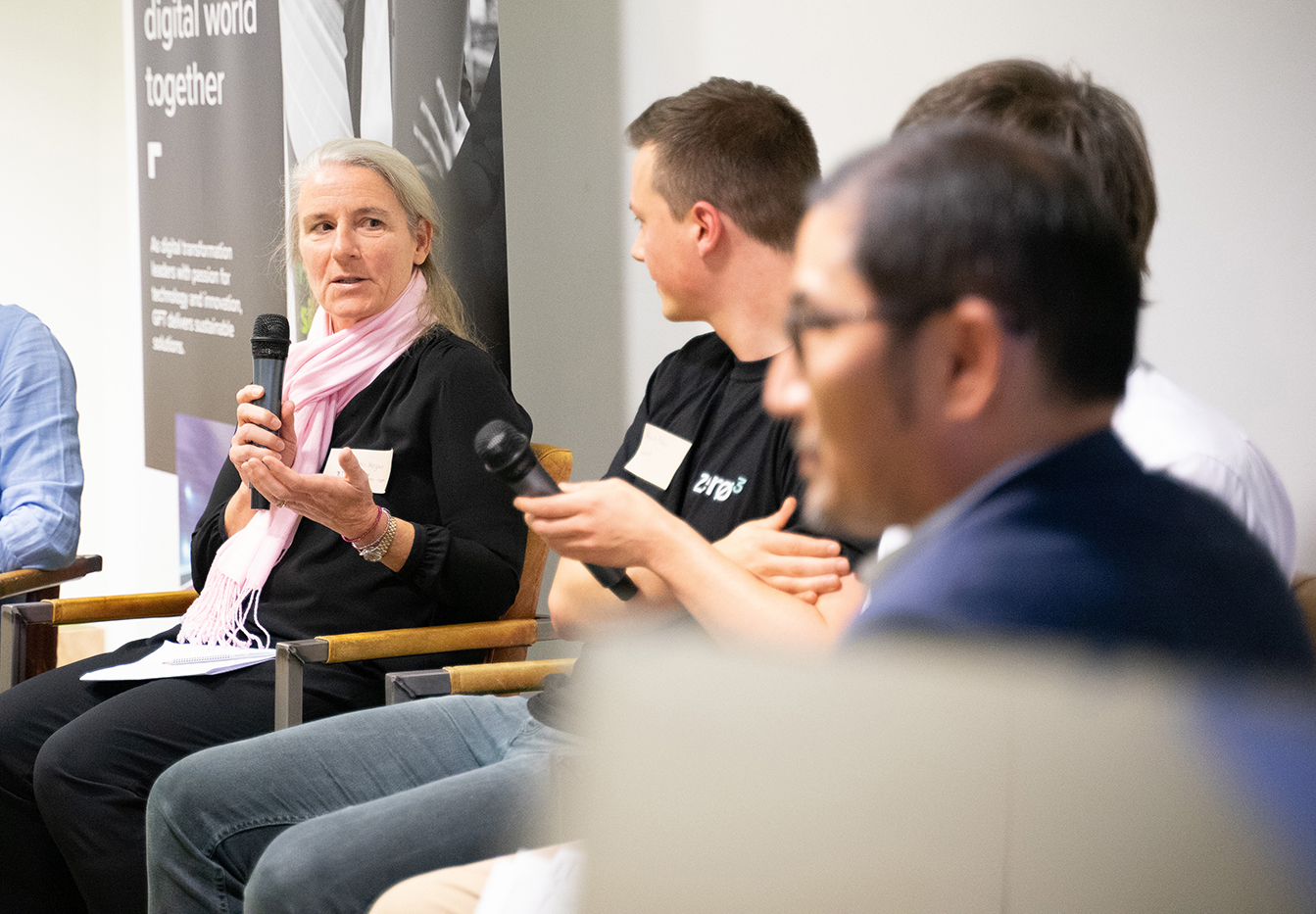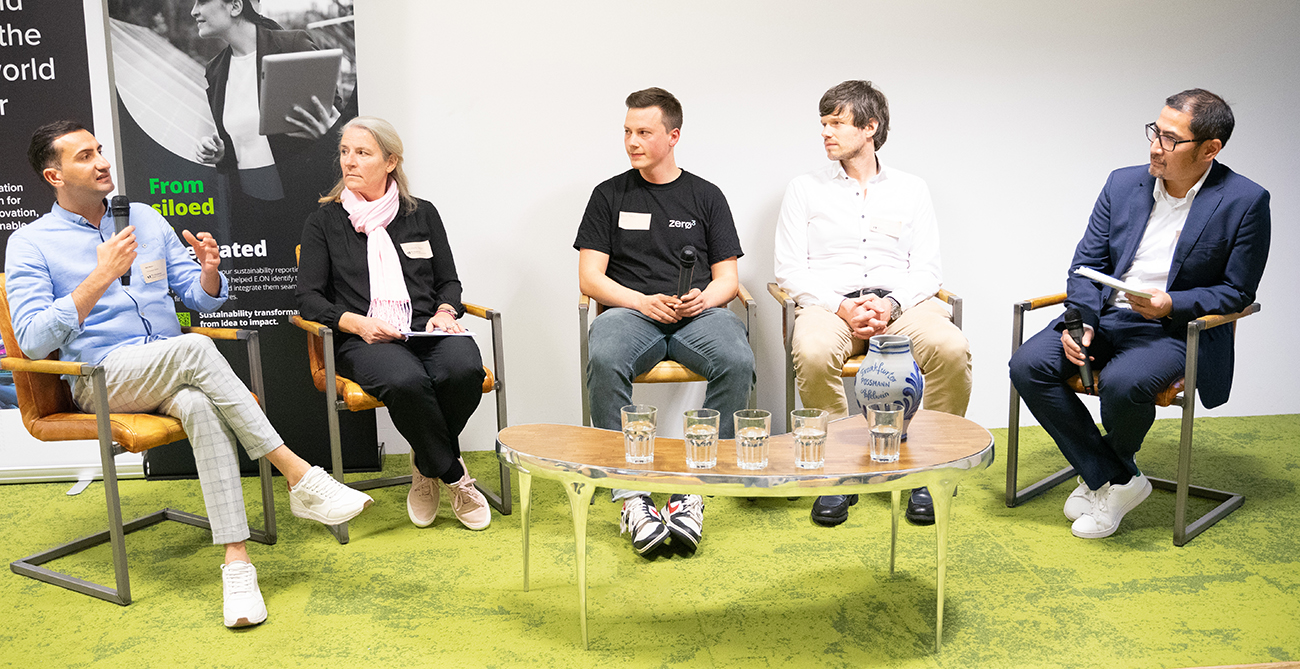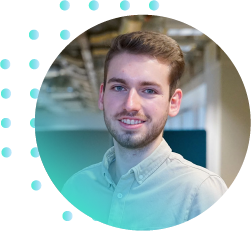Written
Nov. 22, 2023
Author
Alise Munson

Audio
▶️ Listen to the entire evening!
Or listen to individual presentations:
▶️ Sebastian Hoepfner
▶️ Elizabeth Regan
▶️ Tim Schade
▶️ Wali Manan
▶️ Knut Peters

Elizabeth Regan, Director at Eurex Clearing AG (Deutsche Börse subsidiary) answers questions about ESG tools and reporting during a live panel discussion on November 16, 2023 at TechQuartier.
Nov. 22, 2023
Alise Munson

▶️ Listen to the entire evening!
Or listen to individual presentations:
▶️ Sebastian Hoepfner
▶️ Elizabeth Regan
▶️ Tim Schade
▶️ Wali Manan
▶️ Knut Peters
In fact, the ESG data and analytics market is projected to reach $1.4 billion by 2026.
To better understand the connections between tools being developed by startups and the needs of all businesses - from corporate players to SMEs, we invited two startup founders and two corporate ESG innovators to share their thoughts. During a panel discussion held on stage at our third event in the Green Transformation Incubation series, Franz Cong Bui from Börsen-Zeitung asked many questions including these two:
Answering these questions were Sebastian Hoepfner, Data Scientist and Manager from Deloitte; Elizabeth Regan, Director at Eurex Clearing AG (a Deutsche Börse Group subsidiary); Wali Manan, Co-Founder at ESGendium and Knut Peters, Co-Founder at Zero3.

Above: Wali Manan, Co-Founder at ESGendium; Elizabeth Regan, Director at Eurex Clearing AG (Deutsche Börse subsidiary); Knut Peters, Co-Founder at Zero3; Sebastian Hoepfner, Data Scientist and Manager from Deloitte and Franz Cong Bui from Börsen-Zeitung.
Knut Peters, a co-founder at Zero3, shared the belief that reaching our global warming target - maintaining a 1.5-degree Celsius increase by 2050 - will involve different methods and may prove challenging. Firms are recognizing that achieving this goal requires substantial efforts immediately and particularly by 2030.
The pressure to act isn't solely from investors. Consumers are also driving these changes. The general consensus is against 'greenwashing', with companies committed to making strides in eco-friendly strategies. That's where the power of positive belief steps in.
"They are aware and they're trying to make progress."
Zero3, the startup co-founded by Peters, is an intelligent, transformative platform to help companies decarbonize their value chains and achieve net zero on time.
Wali Manan, Co-Founder at ESGendium, emphasized the need to eliminate a subdivided approach in the world of ESG. He posed a question for all of us: Can big corporations achieve their environmental targets single-handedly?
We should go away from looking at ESG goals in silos.
Manan's startup, ESGendium, wants to help small and medium-sized enterprises (SMEs) to understand and report ESG markers. "We have developed a compact ESG tool that helps SMEs to create an easier report and become more sustainable."
The big picture is that companies are not isolated entities, but part of an intricate web. Some companies have a staggering network of around 17,000 suppliers - a figure that surprises many. His point is clear: it's not just about the major players. In fact, everyone, from emerging startups to established consulting firms, has their seat at this table. He advocates for a united front where everyone recognizes ESG as a collective responsibility.
"The way we view and use ESG technology needs to evolve," said Manan. "But don't perceive it as a single solution, like just AI, rather envisage it as a constituent part of a globalized world."
In the world we live in, most people have internet access and, as a result, any movement in one region, say the US, would gradually permeate into other parts of the world such as Asia or Africa. Thus, to work towards achieving our environmental goals, we must take a broader view. We should aim to improve our connectivity, viewing ourselves as individual 'dots' that are interconnected with various other 'dots' like machines and robots.
Manan believes that ESG principles and sustainability will become more pressing in our collective mindset in the next three to five years. He pointed out a growing trend - companies are increasingly being asked about their ESG practices. Many companies are underestimating this and thinking they can delay their response, but this is a mistake.
As Manan put it, "There's no way around it." A company that fails to slowly incorporate ESG principles might feel the impact significantly. The trend is unstoppable, and businesses need to start taking proactive steps towards their sustainable practices.
Sebastian Hoepfner, Data Scientist and Manager from Deloitte, underscored the transformative power of artificial intelligence in environmental, social, and governance (ESG) finance. He additionally encouraged us to not overlook the potential of innovation in the production of key materials.
Artificial intelligence, will for sure play a big role. But I think what's typically overlooked is in the hardware space, and I'm not referring to computer hardware, I'm referring to how to produce cement, how to produce steel, how to produce energy.
Instead of focusing solely on fields like computer science or finance, Hoepfner suggested that we could make a significant impact if more graduates pursued materials science to advance technologies such as battery storage.
Peters expressed the importance of harnessing technology to address climate changes. It's not enough to just measure our environmental impact - we also need to actively reduce it. He highlights the critical need for education in this space, advocating for more learning opportunities so that people are armed not with speculation, but with solid knowledge.
Then there's Elizabeth Regan, a Director at Eurex Clearing AG. She champions understanding the full scope of ESG impacts — not just within businesses, but in our everyday lives.
Do you know what you are doing and what your impact is?
Regan also tackles the concept of the circular economy. Rather than recycling products post-consumption, she suggests that we need to integrate recycling into the production process itself. This, she suggests, would make our economy more sustainable and future-oriented.
Or listen to individual presentations:
▶️ Sebastian Hoepfner
▶️ Elizabeth Regan
▶️ Tim Schade
▶️ Wali Manan
▶️ Knut Peters
Event Recaps

Reach out to Florian for more information and possibilities in our community.